As Catholics around the world know, December 8th is a holy day of obligation to honor the solemnity of the Immaculate Conception of the Blessed Virgin Mary. The Catholic church teaches that Mary was conceived in the womb of her mother St. Anne free from the stain of all original sin. This year, December 8 fell on the Second Sunday of Advent, which takes precedence in the church’s liturgical calendar. Because of this, the church moved the solemnity of the Immaculate Conception to Monday, December 9. Therefore, all Catholics were obligated to attend Sunday mass per usual and then return the next day on Monday, December 9, for the solemnity of the Immaculate Conception, a holy day of obligation.
History of the Feast Day
The solemnity of the Immaculate Conception was established by Pope Pius IX in 1854. As Catholics, we believe that God gave Mary this unique privilege to be free from original sin so that she would be a pure vessel from which Jesus Christ comes forth into the world. Around the world, the Church celebrates on December 8, or this year on December 9th, with mass and encourages Marian devotions such as saying the rosary to honor Mary’s unique role in human history. It is an annual tradition in Rome that on December 8 a firefighter climbs nearly 90 feet using a truck and a ladder to lay a wreath of fresh white flowers on a statue of Mary perched on a column high above the courtyard below. This past Sunday, Pope Francis prayed before this statue of Mary and brought a basket of white flower tied with a yellow ribbon.
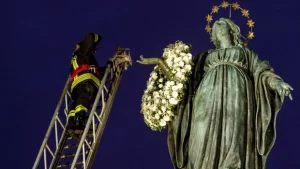
Feast of the Immaculate Conception Mass
Last Monday, Father Polce gave a homily where he talked about Mary, as it was the feast of the Immaculate Conception. More specifically, he talked about how Mary demonstrates the shattering of the devil’s influence. To demonstrate this, he referenced the recent Knights of Columbus Tournament Championship Game. Jesuit was in the championship against St. Mark’s School of Texas. One of the Rangers had driven down the court, put up a shot, and airballed it. Fr. Polce says that it’s natural to make a mistake when you play basketball enough. However, the crowd of St. Mark’s supporters began to shout “Airball!, Airball!, Airball!.” In response, the Jesuit crowd began to chant “Scoreboard! Scoreboard! Scoreboard!,” as Jesuit was leading St. Mark’s at that point. Jesuit ended up winning the game 56-49. When we sin, we should always have the courage to never give up, as Jesus has already won this fight against evil for us. When we airball, Jesus is the one who says “Scoreboard.”
After his moving sermon, the Roundup reached out to him to talk further about Mary and our understanding of the Immaculate Conception.
Interview
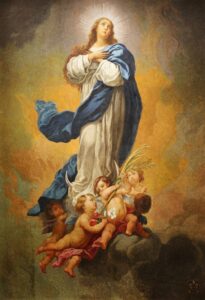 Luke
Luke
What is the doctrine of the Immaculate Conception in simple terms and what does it mean when we say Mary was Immaculately conceived?
Fr. Polce
When we say that Mary is Immaculately Conceived, the Church says that from the moment of her conception in the womb of her mother Saint Anne she was preserved from original sin. That’s the dogma of the Immaculate Conception. The Pope defined it in Ineffabilis Deus in 1854, “We declare, pronounce, and define that the most blessed Virgin Mary in the first instance of her conception, by a singular grace and privilege granted by God in view of the merits of Jesus Christ, was preserved free from all stain of original sin. “
This is confusing to people because Jesus hadn’t been born yet. And so a nice image, a simple image to think about it is that Mary was redeemed by Jesus. She got access to that grace before Jesus came. And how is God able to do this? Well, how is God able to give us grace 2000 years after Jesus came? Because God exists out of time, he can apply the grace of Jesus across the centuries, forwards and backwards.
You and I receive the grace of Jesus Christ as an antidote to original sin which gets rid of the sin after we’ve contracted it. The Immaculate Conception says Mary never had original sin. She was preserved from the stain of sin from the moment of her conception.
Luke
What are the foundations that support this teaching? Are there any biblical foundations, or is it primarily rooted in church history and tradition?
Fr. Polce
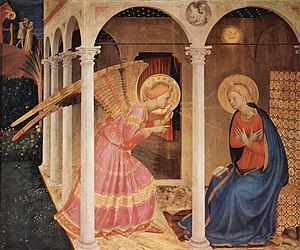
Both. There is a biblical foundation and tradition. The gospel of John says Jesus did many more things that could be written in scripture, but what is contained in scripture is necessary for our belief and our salvation. The Catholic Church recognizes that God has given us more than scripture, but scripture is always our foundation and our core. There is scriptural foundation for this teaching and there are also traditions in the early Christian community that the church draws on to confirm this teaching. The biblical foundation is in the Gospel of Luke at the Annunciation when the Angel Gabriel says, “Hail Mary, full of grace. The Lord is with you.” We read this passage on the Feast of Immaculate Conception. And what does that line say, “Full of Grace”? Nowhere else in scripture does that line “full of grace” apply to any other human being. Theologians have mused about what this phrase is telling us about Mary. To be full of something means to have an absence of anything else.
Mary was full of what? Grace, which is God’s life, God’s love. So she’s full of that. How can there be anything else present in her heart? Because if she had any kind of sin, she wouldn’t be full of God’s love, she’d be mostly full of God’s love. And so from the line ‘Hail Mary, full of grace,’ the church understands that Mary is free of the stains of original sin from conception to her death. She remains sinless.
Mary is free of the stains of original sin from conception to her death.
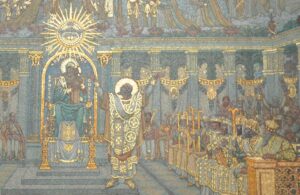
In our tradition, outside of scripture, we see very early on the church both venerating Mary and also teaching about Mary. Saint Justin, an early martyr in the 2nd century, talks about Mary and her sinlessness. We see devotions to Mary in Spain in the early church. We see churches in the East and the West popping up in the first few 100 years that are dedicated to Our Lady. And then we see in the Council of Ephesus, I believe, where Mary is defined as the mother of God. And so this intense interest in the early church to clarify and to promote veneration of Our Lady flows from the biblical times through the formal definition of the Immaculate conception in 1854. So while the church finally defined it in 1854, she believed and professed very early on of Mary’s sinlessness. The church recognized Mary’s special role as Mother of God from the first few decades after her assumption.
Luke
So, we’d already known about the Immaculate Conception for a long time. The Church just defined it.
Fr. Polce
Correct. The church defines things over time when there’s a need. The Catholic Church defines dogmas or doctrines through challenge. The church always believed that Jesus Christ was both God and man, but it’s not until the challenges of Arian heresy and the Nicene Creed that this gets formally promulgated. It is not because the church didn’t believe it. It’s that it became under particular challenge and scrutiny. So, the church in its wisdom and motherly nature clarifies to give us greater hope and devotion and to remind us not to fall into pitfalls of thinking Jesus is an amazing person but not God. The same thing with Mary and the doctrine of the Immaculate conception. You can find it in the writings of church fathers very early on, but no one really challenged it or was bothered by it for a long time. And so it was not until much later, that the church finally put some official language on it.
Luke
This is just another simple question but for our non-Catholic brethren, what does it mean when we say that we venerate Mary? Is it different from worship?
Fr. Polce
Correct. From the earliest times in the church, the Church fathers have always recognized that you worship only God. They always say Mary should be honored. They say Mary should be venerated. They say Mary should hold a special place in our heart. Someone might say “I pray to Mary” or “I pray to the saints”. But that’s just the sloppiness of language. The understanding is not that Mary or the Saints replace God or act independently of God, but rather we’re asking Mary or the Saints to intercede before God for us. Where is the biblical evidence of this? One of the places is the wedding feast at Cana, where Mary is the intercessor between the person wanting wine and Jesus. Who does Jesus listen to? Mary! That’s a biblical example of the role Mary plays.
The church has always honored Mary. Why do we honor Mary? Because Jesus did. Catholics and non-Catholics should remember veneration is not worship, it’s special honor and praise.
Luke
What lessons do you think the Immaculate Conception could offer for Catholics striving to live holy lives? What can we take from it?
Father Polce
What God does in Mary before her birth, I think God desires to do for us at our death. Mary became then an icon of God’s plan for us. Mary was preserved from sin at conception. God wants to make us free from sin at the end of our life if we’re willing to entrust our hearts to him like Mary did.
Luke
Is there anything else you want to say?
Father Polce
If someone struggles to understand or accept the doctrine of the Immaculate Conception, read your bible, study history, and look up when the Christians first started having worship services in which Mary was honored. There are churches that popped up all over Asia Minor and Rome in the early church that are dedicated to Mary that lead us to the Lord.
Secondly, I would say look at the story of Saint Bernadette of Lourdes. She was a young girl in France to whom Mary appeared and declared, “I am the Immaculate Conception.” This was just four years after Pope Pius IX declared the dogma of the Immaculate Conception. The story of Bernadette and the apparitions at Lourdes shows how much Mary loves and cares for us now. Mary’s sinless heart is not turned inward but is turned outward to care for her people. And I think that’s a great consolation in this life that our God gives us a mother that didn’t just watch over Him but also over us and over our church.
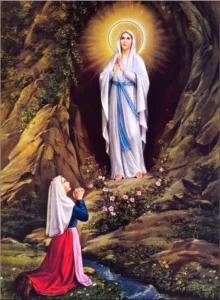
Another reason why the Immaculate Conception matters in relation to Jesus is because a child looks to his mom for imitation of all things, spiritually and physically. And if Mary was not immaculately conceived, if she was not sinless, then Jesus would have grown up imitating someone who is not perfect and that just seems strange. And so God gave Jesus the perfect mother, so that not only could he be born but also he could grow up and be an imitation of perfect love. And so I think when you put that together how could you not believe in the Immaculate Conception? If you don’t believe in the Immaculate Conception, then I think you limit God’s power. I think you presuppose that Mary’s not a perfect witness to Jesus, and I think you limit the action of grace in our world. So there are arguments for the Immaculate Conception from liturgy, from history, and from the bible that God did this amazing thing in the heart of Mary. And it teaches us that He is going to do amazing things in our life too.
That concludes the interview. A big thanks to Father Polce for talking the time to talk to us about the Immaculate Conception and what we can take away from it as Christians.
Stay tuned to the Roundup for more campus ministry coverage!
